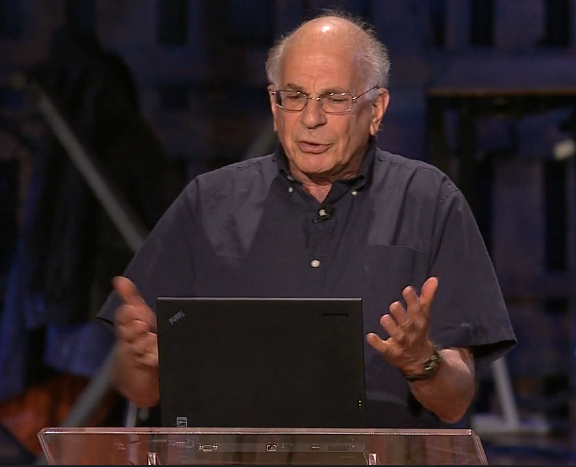And in this way, time is actually the critical variable
因此時間是區分
that distinguishes a remembering self from an experiencing self;
記憶自我和經驗自我的關鍵因素。
time has very little impact on the story.
時間對這個故事的影響不大。
Now, the remembering self does more than remember and tell stories.
記憶自我所做的不僅是記憶和講述故事。
It is actually the one that makes decisions because, if you have a patient who has had, say,
它也是真正做決定的因素,因為,假若你的病人已經歷
two colonoscopies with two different surgeons and is deciding which of them to choose,
過兩位不同的外科醫生來做胃腸鏡檢查,而現在決定從他們中選一位來再做檢查時,
then the one that chooses is the one that has the memory that is less bad,
病人選的將會是記憶中感覺比較好的那位,
and that's the surgeon that will be chosen.
這就是如何選定醫生的。

The experiencing self has no voice in this choice.
經驗自我在做選擇是則無從置喙。
We actually don't choose between experiences, we choose between memories of experiences.
事實上,我們不會在兩段經驗中做選擇。我們是在兩種不同經驗的記憶中做出選擇。
And even when we think about the future, we don't think of our future normally as experiences.
而且當我們設想未來時,一般我們不會以經驗的形式去思考。
We think of our future as anticipated memories.
我們把未來以預想的記憶形式呈現。
And basically you can look at this, you know, as a tyranny of the remembering self,
大體上你可以看到,記憶自我是專制的,
and you can think of the remembering self sort of dragging the experiencing self
你可以想象記憶自我在拽著經驗自我,
through experiences that the experiencing self doesn't need.
他是通過經驗自我不要的經驗來拽著經驗自我的。
I have that sense that when we go on vacations
我有個想法,當我們放假時
this is very frequently the case; that is, we go on vacations,
往往之所以放假,
to a very large extent, in the service of our remembering self.
有很大一部分是為了記憶自我。
And this is a bit hard to justify I think.
我想這有點難來辯證。











